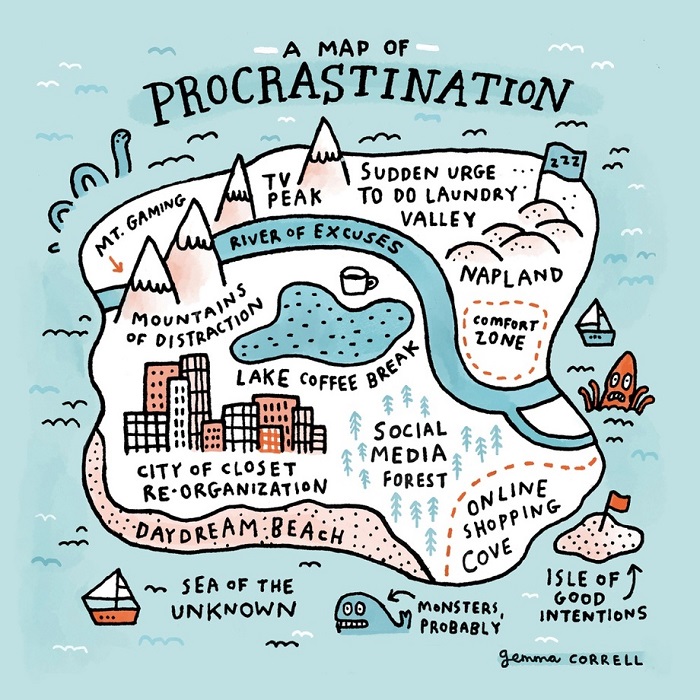Procrastination is a difficult thing on its own, but it becomes a hellish experience when paired with remote work from home. Not only do we face distractions, but in the case of procrastination, it’s as if we embrace them.
Perhaps the ugliest thing about it isn’t the inefficiency it pulls us into. But the sense of guilt, incapability, and anger at ourselves that comes with it.
Our aim with this article is to help you understand where procrastination comes from, and what changes you can make to avoid it completely. With time management tips, self-analysis, and patience, you can conquer this modern bad habit once and for all.
Why do we procrastinate?
It’s important to know your opponent before a battle. And the more we learn about procrastination, the better we can understand why we indulge in it, even if it makes us feel bad in the end.
Let’s take a look at the three most commonly found reasons for procrastination.
a) The illness of perfectionism
We wouldn’t normally connect perfectionism with procrastination. After all, if you want to get something perfect, you’ll more likely try your hardest, and invest your all, right?
Well, that isn’t always the case.
In fact, in most cases, reaching for perfectionism can cause us stress and fear of under delivering. Remember the often-seen trope of writers in movies? How they always tell their agents they’re close to finishing the book, while being anything but? That is precisely how perfectionism breeds procrastination.
With some people, there is an uncompromising feeling that unless their first draft, their project, a blueprint, or a task is perfect from the start – it’s going to be a disaster.
Because a great start insinuates an even greater result. And the fear of being subpar is what makes them put off work.
b) Personal feelings about the task
Sometimes we don’t care about performing a task perfectly.
But there is something about the work itself that’s causing unpleasantness. It’s either too long, boring, tedious… You don’t want to mow the lawn because it takes too long, you need to change clothes, and get the equipment ready.
Or, you have to finish dozens of pages of reports, and the thought of staring at the numbers on the screen for so long is already giving you a headache.
So instead of working on breaking down the problem into manageable steps to fulfill the task, we much rather avoid it until it’s absolutely necessary to finish it.
c) Our brains’ own addiction
Procrastination on its own has one huge advantage over our brains – it’s instant gratification.
Our minds are hooked to anything that brings us joy. Short-term joy especially. That’s why we love eating our favorite food, playing video games or watching movies, browsing social media and so on.
Everything about our technology is programmed to give the brain a shot of the feel-good hormones every time we consume it. But how does that relate to procrastination?
It’s simple. You put off a task because it’s boring, or unpleasant. It alone gives you negative feelings. Once you start putting it off longer and longer, the even uglier feeling of disappointment in yourself piles on. And as the hours or days go by, the feeling amplifies.
Statistically, you are more likely to run away from that ugly feeling procrastination brings by chasing distractions. Because it is easier to do that, than to actively face the negative feelings that come with actually starting work on your overdue task.

To beat procrastination, one thing is crucial
The right way to conquer it is to understand it.
It’s vital to understand that procrastination doesn’t mean you have poor work ethics, that you’re lazy, undeserving of success, or incompetent. It’s our brain’s ingrained way of coping with stress that comes with work we find difficult.
None of the following methods will be useful to you unless we establish that. In the battle with procrastination, you need to be your own ally, not an enemy. Constantly berating yourself will only sabotage your efforts.
The following section will introduce some of the best methods for beating procrastination, as well as preventing it from even happening.
It’s important to mention that you’ll need a lot of patience, get used to failing, and not give up.
As we’ve said, expecting perfection right away will only lead to putting off the necessary work and effort. So, without further ado, let’s dive into tips on handling procrastination.
The best methods to avoid procrastination
1. Learn where you make mistakes
Start by setting down foundations on which you’ll build all the other habits. While you may already be aware of what challenges work from home brings for you, there could be some hidden distractors that cause procrastination.
You know those moments when you catch yourself watching a YouTube video, but you could have sworn that just a second ago you were in your spreadsheet, working? That is precisely what this first method aims to eradicate – hidden time-wasters.
2. How to identify time-wasters in 3 easy steps
- Set a timeframe for every task.
Give a countable unit for everything you do. And try to be as realistic as possible: will it take you an hour, two, or fifteen minutes? Think of the best-case scenario when you work, fully focused.
- You will want to track your workdays every day, for a week.
Get a time tracker software, and make time entries for every task that you perform, every break, and every distraction. It can be challenging, but making a habit of tracking time can have significant benefits outside of improving your productivity. The more you know about your workflow, the more detailed your tracking should be.
- Analyze daily.
At the end of every day, you should take a look at the time you’ve spent on tasks, and compare them to your estimations. This will give you invaluable information on how well you manage your time, and if you even make appropriate estimates. Maybe some tasks take surprisingly less time than you thought.
Additionally, if you take a look at your entire day, you can see if procrastination happens in the morning, afternoon, or evening. Does it happen around mealtimes?
Or when your kids come from school, or during company meeting calls, for example. By logging in every detail into a timesheet, you can get a glimpse at the factors that cause you to procrastinate. And it’s almost guaranteed that some you won’t expect. Understanding how you manage time can help you improve it, and there are countless ways to learn proper time management.
Needless to say, this method can give you a huge advantage only if you’re honest about the numbers. Changing time entries because you can’t face the ugly truth procrastination brings can only set you back.
2. Don’t get overly confident
You’re probably familiar with the story about the tortoise and the hare. When the two animals decide to race, the hare decides to take it easy, thinking the race will be easy to win, since he is naturally faster.
So he stalls, falls asleep, underestimating his opponent. The tortoise keeps trekking slowly towards the finish line and ultimately wins. Because by the time the hare wakes up and gets his head in the game, the tortoise was too far ahead.
Similarly, getting overly confident with a task can lead you to think you can finish it much faster than it’s realistic.
For example, you get a task that needs to be finished by 4:30 PM. It’s only 9:15 AM, so you think there’s more than enough time because it’s something that normally doesn’t take you longer than say… two hours.
Instead of starting on it now, you put it aside to do other tasks, or decide to watch a new episode of a TV show, or do some chores around the house. And as 2 PM rolls in, you start to work on the task.
Only it turns out, the task is a little more complicated, you’ve tired yourself out with the other workload, or there are some other factors you didn’t count it. And you overshoot the deadline.
This problem is easily corrected by simply working on tasks as they come along. If you feel confident about them, use that energy to get started right away!
Time is as steady and persistent as the tortoise. And if you underestimate it, you will end up losing the race.
3. Make the workflow painfully simple
Remember the talk about perfectionism?
Wanting our work to be perfect, outstanding, admirable, can lead to some very poor choices. Namely, we set the bar too high, and too vague. If you approach, let’s say, a writing task with:
“This article needs to be my best work yet.”
You’re already setting expectations high, and not really defining what it is that has to make it “the best”.
The best way to fix this mindset to avoid procrastinating on what you’ve set up to be the holy grail of projects is to have a breakdown. And no we don’t mean a mental breakdown, but one of every task you get.
Write down the entire work process. Using the article example above, it would look like this:
- Start with which websites you’ll need to research,
- Then compile a small archive,
- Then read through and take notes,
- Write bullet points to create the framework for the article,
- Start writing the first third of the first draft.
We often make the mistake of not making these step-by-step instructions because we feel it babies us, in a way, or we’ve done the same work so many times we know it by heart.
But that’s exactly when we begin to ignore the process and focus only on the goal, which becomes vague and difficult to handle.
Additionally, if you do similar tasks day in and day out, create templates to work by. Making a routine list will help keep you on the right track and significantly lessen chances of procrastination.
4. A workspace makes all the difference
Working from home can create a divide between yourself and the company (or client). You don’t actually have the feeling of working, because there’s no office, no work clothes, no coworkers…
To combat this feeling of disconnect, you can look into shared spaces like coworking hubs, libraries, or less crowded coffee shops.
If your home provides more procrastination triggers, like your family, flatmates, noise, the neighborhood, or the TV, then look for a place that will help with focus.
Write a list of all the little things that cause your attention to shift elsewhere. Then try to find a place that has everything opposite that list.
For example, you don’t have a problem with noise, as there are headphones, but you have kids who constantly want your attention. So what you can choose is a coffeeshop – your kids will know you’re unavailable, so they won’t look for you, and you retain that background buzz of conversations.
5. Communicate boundaries – with yourself
If we were talking about eliminating distractions, we would talk more about creating boundaries with other people.
In this case, however, procrastination is something you actively decide to do, to avoid work.
And if you notice a pattern where you answer every call during work hours, do menial chores for others, and gladly accept to walk the neighbor’s dog for two hours a day, then you’re not setting boundaries with yourself.
This is a situation where you will have to parent yourself. If you’re the kind of person who thrives on helping others because you can afford it by working from home, by all means, do! But limit that help as much as possible. Here are some examples:
- If you’re accepting deliveries for others – have them pick them up outside work hours. Don’t deliver them personally or invite those people over for a chat as an excuse to procrastinate;
- If you’re walking someone’s dog, do it during already established breaks;
- Turn off your phone or set it to airplane mode;
- Have set days for grocery shopping; let your flatmate/partner know about them, so they know not to ask you outside those days (or you’ll cave in and accept);
Let your family members/friends/partners/flatmates know about this plan. Have them participate as well by asking little or nothing from you, or have them reel you back in when you start offering them favors.
6. Treat procrastination like a bad habit
The biggest thing you can do to turn this battle around is to recognize the moment your need for procrastination arises.
Just like with other behaviors, like binge eating, or getting anxious, or angry, you need to learn how to catch that moment when the desire comes. Once it’s recognized, you can make a conscious effort to actively go back to work.
Like we’ve said, the brain chases the fix of feel-good hormones. It wants to avoid that boring, unpleasant feeling of work. And unless we catch the moment our brain shifts to that needy mode, we are quick to listen to it and shift focus to something more pleasing.
Many psychologists agree that the first step to combating any bad habit is to recognize when we start to relapse. In an article on breaking bad habits, author Crystal Raypole advised:
“Take a few minutes to consider why you want to break the habit and any benefits you see resulting from the change.
For added motivation, write your reasons down on a piece of paper and keep it on your fridge, bathroom mirror, or another place where you’ll see it regularly.
Seeing the list can keep the change you’re trying to make fresh in your mind. If you do happen to fall back into the habit, your list reminds you why you want to keep trying.”
So, to ensure that you can properly motivate yourself to ignore the need for procrastination, keep a reminder of why that task or chore is worth the temporary unpleasantness.
7. Digital detox to eliminate addiction
We are already all too familiar with how to deal with social media if we want to be more productive.
But did you know that a digital detox outside your work hours can help you with work procrastination?
A digital detox is a form of abstinence from the feelgood stimulus our brain gets through social media. Put simply – you avoid any digital entertainment that gives you temporary satisfaction but no long term benefit.
We often turn to checking Twitter, Instagram, or Facebook as we work, because it only takes a minute. But those minutes add up and by the end of the day, we’ve wasted hours.
To properly detox from all instantly-gratifying entertainment, you can do several things.
- Limit your social media exposure to under an hour a day, and only outside work hours;
- Choose an app designed to be a helpful guide;
- Don’t reach for your phone the moment you wake up;
- Start your day with tasks that don’t include the computer or phone;
- Limit movies/video games to a few hours a week.
These are just some of the numerous rules you can employ. What is important is to rewire your brain to stop chasing flashy distractions. And the more you build up the habit in your free time, the easier it will be during work.
8. Shorten the work hours
Job allowing, you will want to try shortening your work hours. As we work from home, we realize that there’s really no limit to how long you can sit in front of your computer. Even if you stay until 10 PM, your bed is right there – no commute to home means more time to work!
And so, knowing that, a lot of us make the mistake of procrastinating because we can make up for it any time during the day. To overcome this, make strict internal work hours. If your workday stretches out to 12 hours, procrastination included, cut it down to 8.
If you need an incentive to discipline yourself, promise daily reports to your supervisors, or share with them your list of tasks for the day, and have them monitor it as you clear out the tasks. Having less time at your disposal is undoubtedly going to push you into working more diligently.
To sum up
Procrastination is a more challenging hurdle when working from home. There is something about the office surroundings that seems to put us in work mode. But the home office poses more risks of dropping focus and succumbing to distractions.
It takes a lot of restraint and discipline, but the sooner we start understanding why we procrastinate, the closer we are to getting out of the vicious circle. We hope that these tips were useful and interesting, and that you’ll be able to use them to build strong, productive habits.
Author bio:
Nikola Radojcin has been working from home since 2014. Over the years he picked up some tricks he found very useful. Currently, he works at Clockify where he helps his colleagues utilize time in the best way possible.




 Ozone Layer: All You Need To Know
Ozone Layer: All You Need To Know